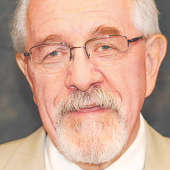- Christmas shopping is done, presents wrapped, strings attached? (12/14/16)
- Cecil is dead and human lives are threatened every day (8/12/15)
- As state flags go, Nebraska's ranks 50th (7/8/15)
- When everything looks like a nail (4/29/15)
- Who remembers to coal slurry pipeline debate? (3/11/15)
- More revelations in Department of Corrections mess (12/17/14)
- The Legislature becomes more Republican (11/19/14)
Opinion
Opposition forming to minimum wage ballot question
Wednesday, July 30, 2014
Nebraska voters will have an opportunity in November to weigh in on raising the minimum wage to $9 an hour by 2016. Proponents say raising the minimum wage would allow more Nebraska families to make ends meet. Opponents say it will be a burden to small businesses and will force them to increase prices or lay off staff to make ends meet.
State Senators Jeremy Nordquist of Omaha and Danielle Conrad of Lincoln spearheaded the statewide drive to petition the matter onto the ballot after lawmakers failed to pass a bill that would have increased the wage from $7.25 an hour -- which is also the federal minimum wage -- to $9 making Nebraska the 22nd state to raise the minimum above the federal standard.
According to the Bureau of Labor Statistics, Nebraska ranked 13th-highest for the percentage of hourly workers making at or below minimum wage and second highest among neighboring states. Voters approved minimum wage increases in 2006 in Colorado and Missouri and four other states. State officials in four more states also raised the minimum wage. The rates in border states Colorado and Missouri are $8 and $7.50 respectively. Washington State has the nation's highest at $9.32. Seattle has a minimum wage of $15 per hour.
Nebraska Taxpayers for Freedom spokesman Doug Kagan admits that opposition to the measure, following a successful grassroots petition effort to get it on the ballot, will be difficult. Similar proposals have been overwhelmingly successful in other states. He says the campaigns against those efforts have been weak, but he hopes the effort in Nebraska will be stronger.
Kagan says increasing wages will result in an increase in the cost of goods and services, an increase that can only be passed on to consumers. In labor-intensive industries, it will be hard to keep a strong employment force.
Low unemployment in Nebraska has created a labor shortage, which naturally pushes wages higher, thus negating the need for the ballot approved increase.
A lobbyist for the Nebraska Federation of Independent Business says raising the minimum wage hurts employment and often results in the lowest-paid employees losing their jobs. He cautions that an increase in the minimum wage, particularly on the heels of a recession, simply adds cost to the bottom line for already struggling small businesses.
Nordquist argued during the waning days of the legislative session that Nebraska's middle class is shrinking and the median household income is shrinking along with it. When efforts by lawmakers failed to advance the bill on a 20-20 vote, Nebraskans for Better Wages was formed and paid petition circulators between $10.50 and $12.50 an hour to collect the necessary 80,000 signatures to get the measure before voters. The group turned in nearly 135,000 signatures.
Opponents plan to take their message to newspaper editorial pages, a public speaking tour and social media. The message will be the impact of increased wages on small business and the layoffs and closings that could follow if labor costs soar.
Proponents simply say that it's time to raise the wage, which has not been increased since 2009. They cite what they call continuing poverty and the struggle for single parents to survive.
Increasing the minimum wage is an admirable goal. But, who knows what the right minimum wage is for each business? Who knows what the breaking point will be for each business?
Counting the cost of raising the minimum wage makes sense.
Let's hope that voters consider the issue carefully before marking their ballots.

